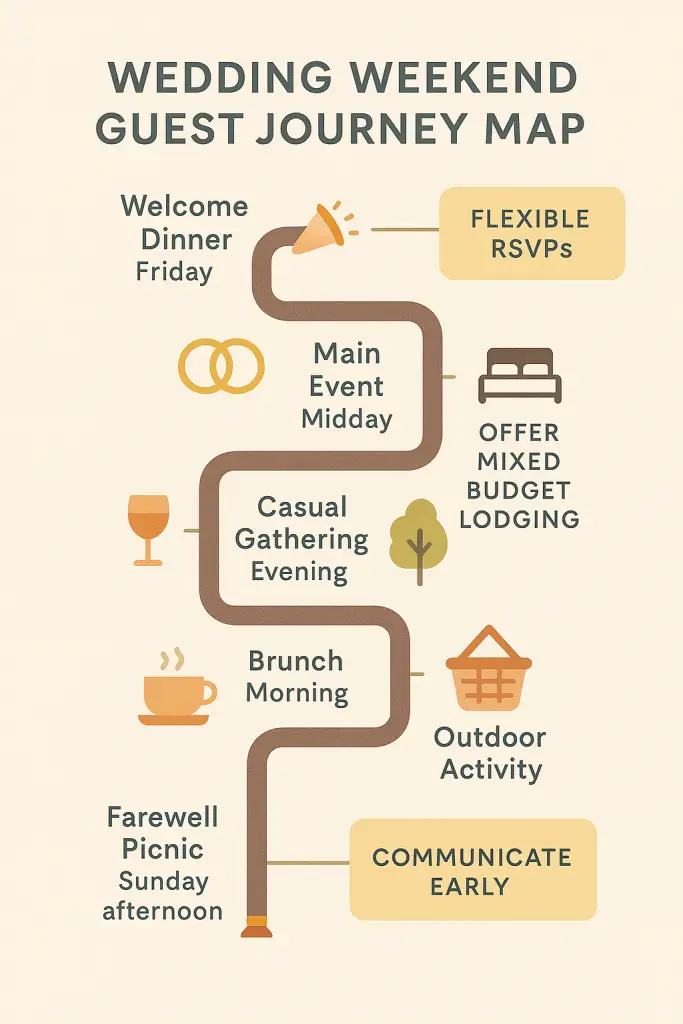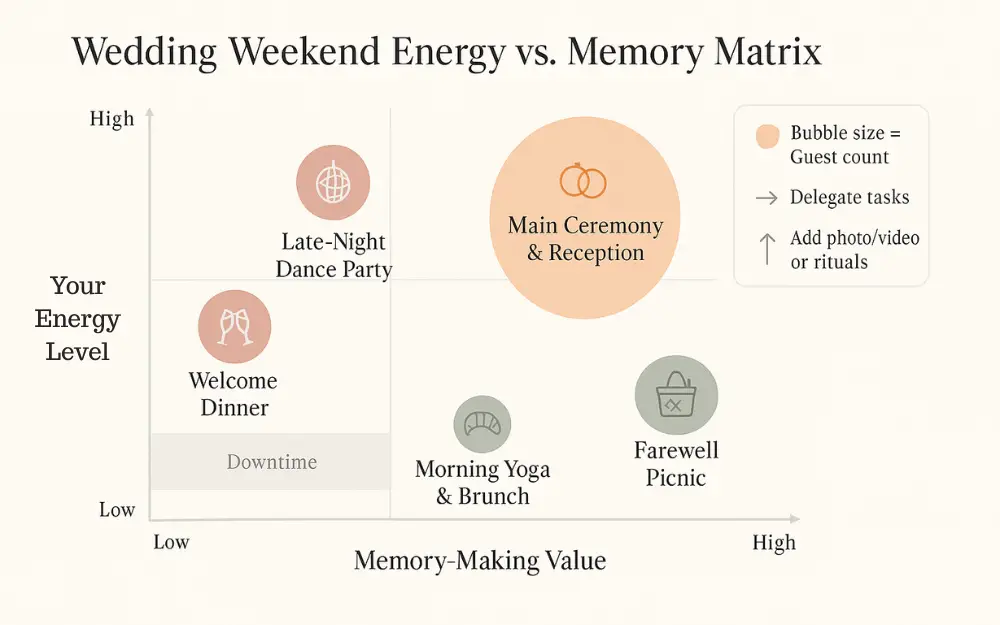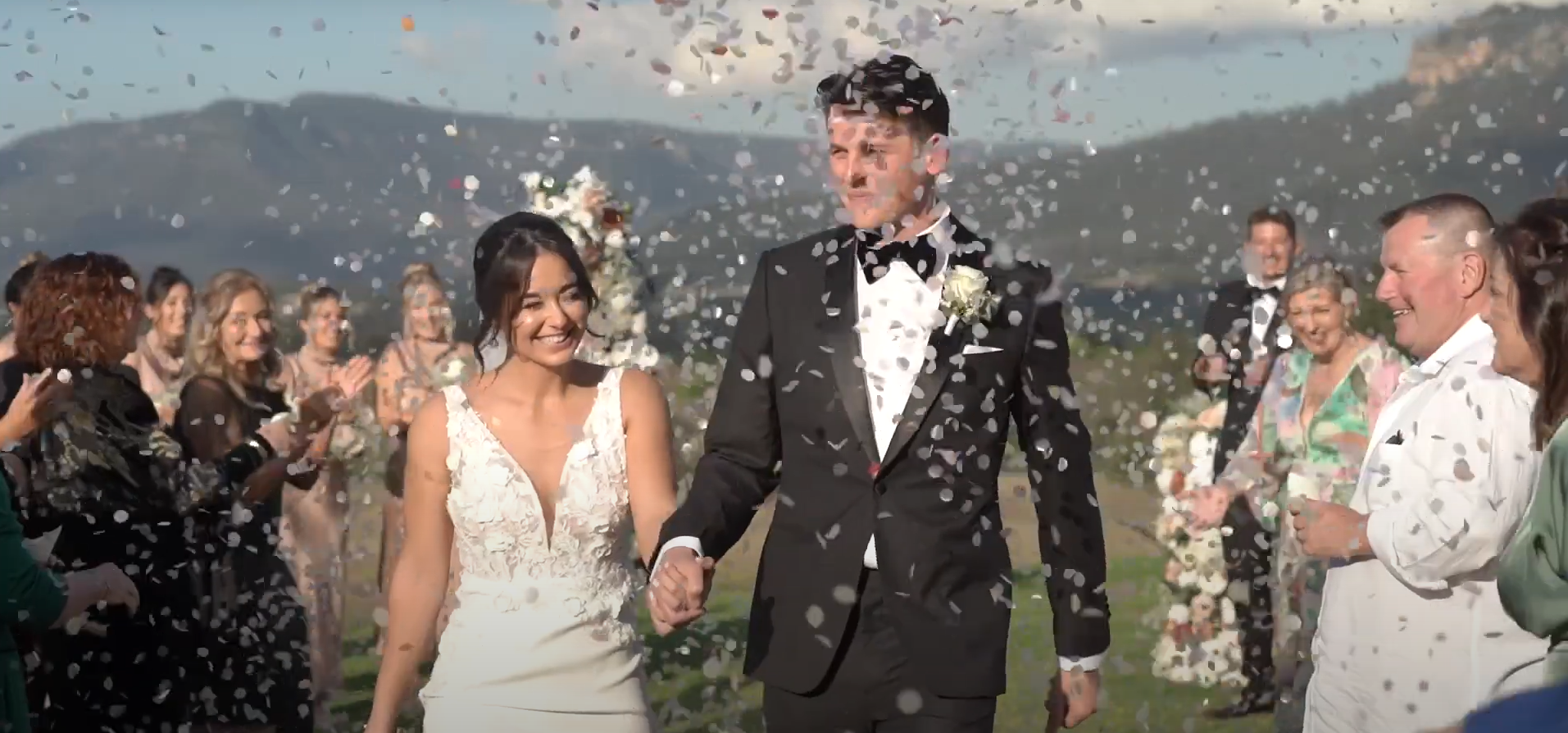Planning a wedding can feel like a blur—after months (or years) of preparation, the big day flies by in a flash. It’s no wonder many couples are choosing to stretch their nuptials over an entire weekend or even several days.
Multi-day weddings, often dubbed “wedding weekends,” are exactly what they sound like: celebrations that span two or more days with multiple events. This trend has been gaining momentum as couples seek to make the most of their time with loved ones.
In this article, we’ll explore what multi-day weddings entail, why they’re growing in popularity, how to plan one, and important things to keep in mind.
What Is a Multi-Day Wedding?
A multi-day wedding is a wedding celebration extended beyond a single day. Instead of just a ceremony and reception, couples plan a series of events across multiple days.
For example, a typical three-day wedding weekend might include a welcome party or rehearsal dinner on Day 1, the ceremony and reception on Day 2, and a relaxed farewell brunch on Day 3.
Some multi-day celebrations are even longer, especially in cultures that traditionally have multiple ceremonies (for instance, Indian weddings often span several days with distinct rituals and parties).
In pictures: Priyanka Chopra and Nick Jonas’s wedding ceremonies.
Tap to see: https://t.co/6ywVWYqUdW pic.twitter.com/wEqyWBtfO4— VOGUE India (@VOGUEIndia) February 26, 2025
By hosting several events, multi-day weddings allow couples and guests to spend quality time together in a more leisurely way.
These celebrations can take many forms: a casual backyard BBQ on Friday, a formal wedding on Saturday, and a send-off breakfast Sunday; or a destination wedding itinerary filled with local activities and sightseeing for guests over a long weekend.
The key is that it’s more than one day of festivities, giving everyone extra time to mingle and make memories.
Why They’re Growing in Popularity
Why have multi-day weddings “quickly caught on and even become the norm for many American couples”?
First, they give newlyweds far more quality time with the people they love. Instead of racing through a single reception and exchanging hurried greetings, a weekend’s worth of gatherings—say, a welcome dinner, ceremony day, and day-after brunch—lets everyone linger over conversations, dance longer, and create extra memories.
A stretched-out schedule also makes it easier to blend cultures and traditions. Partners from different backgrounds can devote one event to a tea ceremony or sangeet and another to Western-style vows, so no ritual feels rushed or overshadowed.
Kourtney and Travis's nuptials were the pinnacle of a multi-day, Dolce Vita-inspired affair: the weekend kicked off on Friday with a welcome dinner at Ristorante Puny, followed by a Saturday afternoon boat trip, with Kim Kardashian and Kendall Jenner: https://t.co/62aaqmJ5du pic.twitter.com/HJzKYrje57
— British Vogue (@BritishVogue) May 23, 2022
Many communities (Indian, Chinese, Jewish, and others) already embrace multi-day customs, making a wedding-weekend format a natural fit.
Couples love the freedom to add unique experiences, too. With extra time they can turn the wedding into a mini-vacation—sunset cocktails, a group hike or city tour, karaoke night, then the formal celebration the next day.
Resorts now market “wedding-weekend” packages (Casa de Campo and similar properties), reflecting how popular the extended format has become.
Finally, a post-pandemic mindset is pushing pairs to go all out. After years of postponements and downsized guest lists, 2022 trend reports note that more couples are planning multi-day or multi-event weddings—with smaller groups if necessary—to make every moment feel personal and unforgettable.
In short, why have one party when you can create an entire weekend of celebration?
How to Plan a Multi-Day Celebration
Set a Vision and Budget
First, decide how many days you want to celebrate and what each gathering should feel like—perhaps a relaxed pizza-party welcome followed by a black-tie reception, or a weekend filled with camping and bonfires. Once the vision is clear, outline a realistic budget.
Multi-day events mean extra venue rentals, catering, and décor, so identify where to splurge and where to scale back. A solid budget early on prevents unpleasant surprises as plans evolve.
Choose the Right Venues
Some couples book a single resort or estate—like Rosewood San Miguel de Allende—so everyone stays together, keeping logistics simple. These venues often offer culture-specific activities for guests to enjoy, and you can also provide a handpicked list of local attractions to encourage exploration. Others prefer different settings for each event—say, a local brewery for the welcome party, a church for the ceremony, and a hotel for brunch—to give guests fresh scenery.
Ask venues about multi-day bookings, on-site lodging, and bundled weekend packages. All-inclusive options can streamline planning, but read the fine print to confirm what’s covered.
Create a Detailed yet Flexible Itinerary
Sketch out the flow of each day—Friday welcome dinner, Saturday ceremony and reception, Sunday farewell brunch—and build in downtime so guests can rest or explore.

Too much structure can make the weekend feel like a conference; balanced free time keeps things relaxed. Once the schedule feels right, post it on your invitations and wedding website so everyone knows what to expect.
Inform and Invite Guests Early
Because you’re asking for several days of their time, send save-the-dates nine to twelve months ahead. Make it clear that it’s a wedding weekend and point everyone to your website for the full itinerary, dress codes, maps, and FAQs.
Closer to the date, use email updates or a group chat for quick announcements—especially handy for last-minute changes like a rain plan.
Logistics for Travel and Accommodation
Reserve hotel room blocks at group rates or share a shortlist of nearby lodging options. For intimate gatherings, consider renting a large vacation home or a cluster of cabins for your wedding party.
Map out transportation—airport shuttles, buses between venues, ride-share vouchers—so guests can navigate the schedule with ease.
Coordinate Vendors for Multiple Days
Decide whether to keep the same vendors across events (a single photographer for cohesive photos) or switch things up (taco truck one night, plated dinner the next). Share the full timeline and venue details with every vendor, including setup windows and backup plans.
A professional planner or at least a day-of coordinator can manage these moving parts, letting you focus on celebrating.
Add Personal Touches
Use the extended format to showcase your story: welcome bags with local snacks, a karaoke night if that’s your thing, or an icebreaker game if many guests haven’t met. Personal details turn a series of parties into a memorable, immersive experience that feels authentically you.
Things to Keep in Mind
Budget and Cost
More days usually mean more spending—extra venue hours, additional meals, décor, and sometimes lodging or transportation. A multi-day wedding can absolutely work on a modest budget, but it takes strategic planning.
Decide which events merit the biggest investment and keep the rest simple (for example, a casual backyard barbecue instead of a catered dinner). Remember that guests also shoulder extra costs for travel and accommodation, so factor their wallets into your decisions.
Guest Convenience and Expectations
An extended celebration is a bigger ask than a single-day affair. Some friends may not be able to attend every event because of work or finances, so make supplementary gatherings optional and low-pressure.
Offer a mix of lodging at different price points, negotiate group rates, and communicate early and often. Show gratitude to anyone who can join the full weekend while warmly welcoming those who can only attend the main day.
Logistics and Downtime
Multiple events mean more moving parts, but resist the urge to fill every minute. Build in quiet periods so guests can recharge or explore on their own.
Vary the tone of each gathering—pair a high-energy dance party with a relaxed brunch or outdoor activity—and always plan a weather backup for anything outside. If Day 1 ends late, start Day 2 a little later so everyone stays refreshed.
Personal Energy and Enjoyment
You and your partner will be “on” for longer, so pace yourselves. Delegate tasks—assign a trusted friend or coordinator to oversee each event—stay hydrated, and sneak off for short breaks when you need them.
The goal is to enjoy the extended celebration, not feel depleted halfway through.

Memories and Meaning
A wedding weekend provides more chances to create lasting moments. Consider hiring your photographer or videographer for additional events such as the welcome dinner or farewell brunch, and use each gathering with intention: a family-bonding welcome night, an intimate cultural ceremony, a relaxed send-off meal with close friends.
Thoughtfully planned, a multi-day wedding offers a richer, more personal celebration for everyone involved.
Where Do We Go From Here?
A multi-day wedding isn’t the right choice for every couple, but it’s certainly a trend worth considering if you crave a more immersive celebration.
By extending your wedding over a couple of days, you give yourself and your guests the gift of time – time to relax, connect, and truly rejoice in the moment rather than watching it whirl by. As with any wedding, the key is thoughtful planning and personal touches.
Whether you host a two-day bash or a week-long extravaganza, keeping your guests comfortable and the vibe true to you as a couple will ensure your wedding is a memorable hit.
Multi-day weddings are all about celebrating bigger, longer, and more meaningfully. If you’ve ever come home from a wedding wishing you had just one more day to savor the fun – now you can!
With good planning and consideration, a multi-day wedding could turn your big day into an unforgettable journey for everyone involved. So as you imagine your wedding, don’t be afraid to dream beyond a single day.
The rise of multi-day weddings proves that sometimes, more is more – more time, more joy, and more memories to cherish.
Here’s to a celebration that doesn’t fit into just one day, and to making every moment count!

